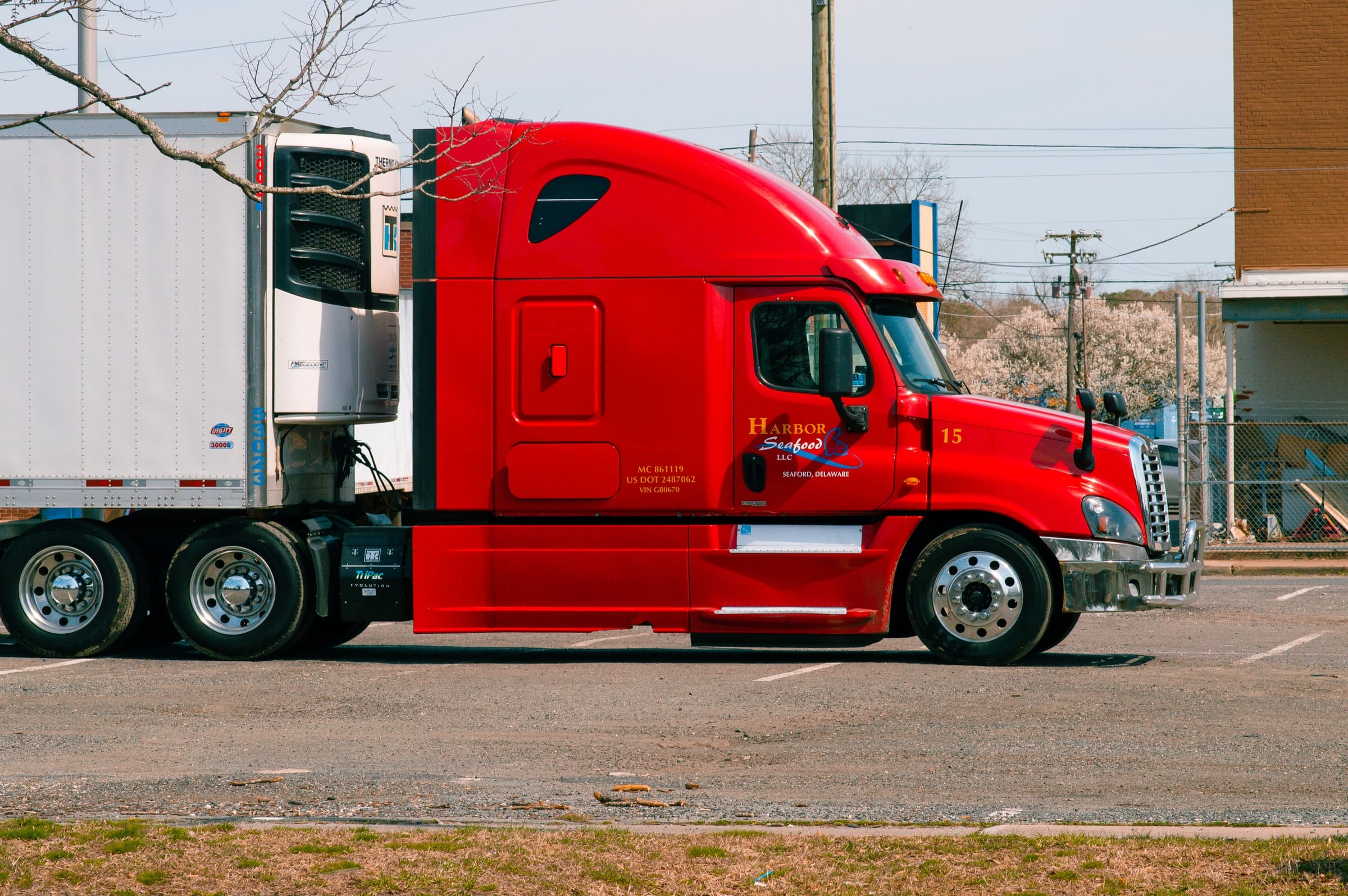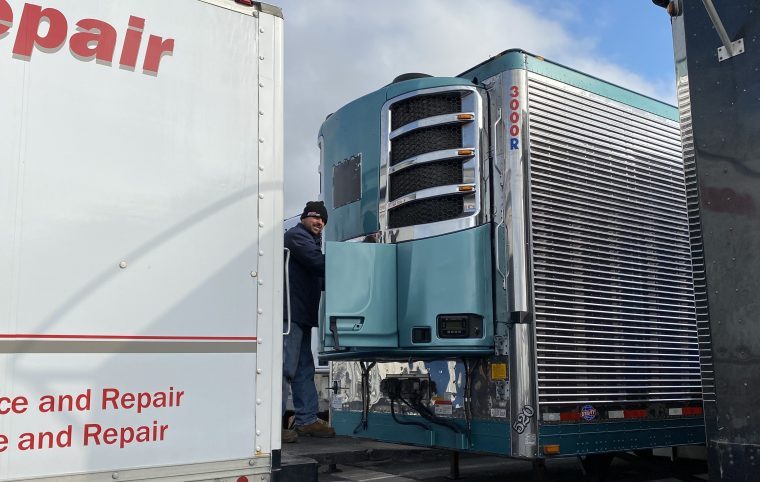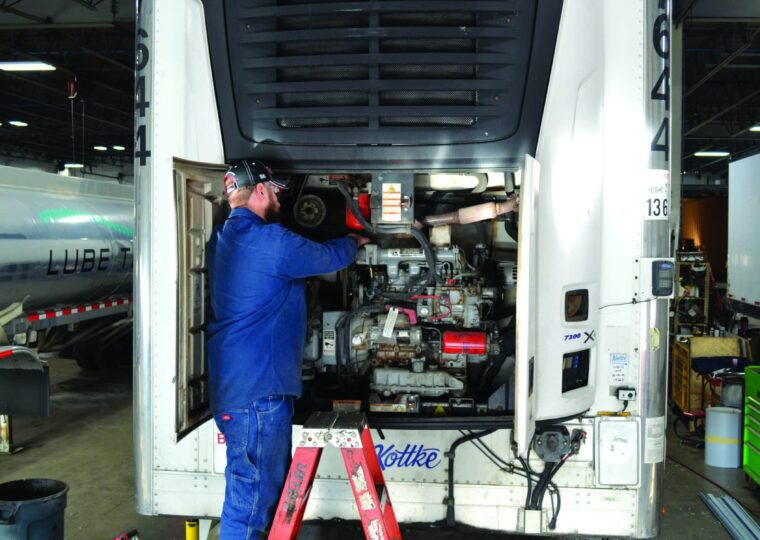Semi truck operators who need refrigerated or “reefer” trailers understand that the trailer is an integral part of their transportation operation. It allows the driver to get refrigerated or frozen goods across significant distances without spoiling, and can help open up new clients or jobs for them as well.
Whether buying a reefer trailer new or used, there are some things to consider and potentially evaluate before buying. If you already own a reefer trailer, there are some issues to keep an eye out for, which may be indications that service or repairs are needed. We’re going to take a close look at some of the most common problems with reefer trailers, and what might be needed to fix them.
 The Most Common Problems With Reefer Trailers & Potential Fixes
The Most Common Problems With Reefer Trailers & Potential Fixes
There are a lot of things that can potentially need service or repair with any trailer, but there are some failures that are more common with reefer trailers. We’ve kept the list to only issues that can go wrong with reefer trailers, and avoided issues with the doors or trailer frames themselves.
1. Fluid Leaks
Reefer trailers are cooled by large refrigeration units that use a sealed system similar to what is found in refrigerators and freezers, only much more heavy-duty. This system relies on refrigerant to remove heat from a system, as well as to lubricate the mechanical parts of the sealed system, like the compressor. Leaks can reduce or eliminate the trailer’s ability to maintain proper temperatures.
Common places for leaks are the equalizer tubes that balance the refrigerant level in the compressor, and in the hoses or belts that drive the system. A UV light can often be used to see leaks via UV-reactive dye frequently included in refrigerants.
2. Air Leaks
Air isn’t part of the sealed system, but is a necessary part of the cooling effect. The reefer trailer needs to be largely airtight so that the temperature can be maintained and there is a low level of thermal loss. Less cold air leaving the trailer means less warm air coming in, resulting in a cooling unit that doesn’t have to work as hard.
To make sure the air leaks are minimized, ensure the door seals well. Also be sure to look at the seals around other potential points of leakage, like air chutes.
3. Compressor
The compressor is the part of the reefer trailer that compresses the refrigerant, taking most of the heat out of it and transforming it from a gas back into a liquid. The compressor is driven by a small diesel engine, and if it fails it will need to be replaced or rebuilt. Some compressors can be rebuilt or remanufactured, but some can’t; in many cases, replacement is the only fix.
4. Condenser
Much of the remaining heat in the refrigerant is removed by the condenser, which acts as a large heat exchanger. The condenser helps dissipate the heat much quicker and easier, and functions similarly to how the radiator cools a vehicle’s coolant. Condenser failures are generally marked by the need to replace the condenser.
5. Evaporator
The evaporator is part of the refrigeration system located inside the reefer trailer and is what helps transfer the heat of the trailer to the refrigerant. While absorbing heat, the liquid expands into a gas and the air is blown over the coils, helping to cool the area much more efficiently. The evaporator is another component that is rarely repaired and commonly just replaced when failures occur.
6. Sensor Operation
Making sure the calibrators and sensors of the reefer unit are working well is crucial in minimizing risk to the cargo. The calibrators help to regulate the temperature in the trailer, and if they are faulty or damaged, they can cause the sensors to report inaccurate conditions. Wrong readings at the wrong times can mean no alerts and potentially spoiled cargo. Calibrators and sensors should be professionally tested and calibrated at a trusted, local truck maintenance shop.
7. Bulkhead Operation
Bulkheads are vital in separating different temperature zones within the same trailer. They are used to separate temperature-sensitive cargo and if they are damaged and don’t allow the needed rates of airflow, it can lead to damaged sections of cargo. Having the bulkheads professionally evaluated can ensure that they are functioning optimally, and allowing your cargo to meet temperature-regulation requirements.
 Maintenance & Troubleshooting Tips
Maintenance & Troubleshooting Tips
The best way to keep your reefer trailer problem-free and on the road is to make sure that constant, regular maintenance and checks occur. Each refrigeration unit manufacturer will have its unique guidelines on maintenance intervals and processes.
For most drivers, particularly those that see frequent reefer trailer use, getting regular service checks for the unit about every 90 days is average. Summer months or more regular use necessitate more frequent checks. Additionally, before each trip, drivers should have their own reefer inspection checklists, which can help catch small issues that may contribute to lost cargo.
Some of the common pre-trip inspection tasks include:
- Checking belts, hoses, and seals for any drying, cracking, or signs of excessive wear.
- Checking for visible leaks around the refrigeration unit itself.
- Ensuring that the door closes tightly, seals well, and is able to lock securely.
- Making sure monitoring displays are relaying accurate information regarding cargo temperature.
- Checking that alarms are set to properly notify the driver of a potential problem before critical temperatures are reached.
To improve the chances of successfully troubleshooting reefer unit problems, the driver or operator should be well-informed and familiar with the trailer and the alert system it contains. Knowing how to read and interpret potential alerts from the refrigeration unit can be vital to an accurate diagnosis, with specific codes indicating problems with belts, battery systems, or even pressures. Also, keeping a UV leak detection kit onboard can help determine the presence and location of potential leaks in the sealed system.
Trust Your Reefer Trailer Repairs to Blaine Brothers
Having a reefer trailer can make your transportation operation more resilient, especially in times of reduced need for conventional transportation. While the trailers and refrigeration units themselves can be quite costly, those costs can rapidly increase when maintenance and potential repairs are figured in.
If you have a reefer trailer and need a local shop you can trust to fix it, Blain Brothers is here for all of your needs. Even if you’re only considering buying a reefer trailer, make an appointment to have Blaine Brothers look the unit over to make sure you’re not going to get any expensive surprises in the near future. Contact Blaine Brothers today for more information, or to schedule your appointment at any of our locations in Minnesota or Wisconsin!


 The Most Common Problems With Reefer Trailers & Potential Fixes
The Most Common Problems With Reefer Trailers & Potential Fixes Maintenance & Troubleshooting Tips
Maintenance & Troubleshooting Tips